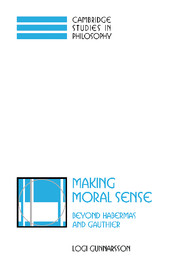Book contents
- Frontmatter
- Contents
- Preface
- PART I PROBLEMS
- PART II AGAINST RATIONALISM
- PART III FOR THE SUBSTANTIVE APPROACH
- 10 Self-understanding and self-assessment
- 11 The possibility of progress
- 12 Practical arguments vs. impossibility arguments
- 13 Evaluation of others
- 14 Universality without neutrality
- PART IV FOR PARTICULARIST SUBSTANTIVISM
- Appendix Transcendental vs. universal pragmatics
- Bibliography
- Index
11 - The possibility of progress
Published online by Cambridge University Press: 22 September 2009
- Frontmatter
- Contents
- Preface
- PART I PROBLEMS
- PART II AGAINST RATIONALISM
- PART III FOR THE SUBSTANTIVE APPROACH
- 10 Self-understanding and self-assessment
- 11 The possibility of progress
- 12 Practical arguments vs. impossibility arguments
- 13 Evaluation of others
- 14 Universality without neutrality
- PART IV FOR PARTICULARIST SUBSTANTIVISM
- Appendix Transcendental vs. universal pragmatics
- Bibliography
- Index
Summary
In this chapter, I shall address the problem of arbitrariness and the problem of controversiality (see 10.4). In order to resolve these problems, I shall offer an account of substantive justifications which demonstrates the critical potential of the substantive approach. This account enables me to resolve the two problems and to show that to determine whether we suffer from false self-assessment, we should sometimes rely on substantive reasons rather than on subjectivist rationalistic reasons. In the third section, then, I shall discuss whether justice poses any special difficulties for the substantive approach to the problem of self-assessment. After concluding the discussion of self-assessment, I shall, in the last section, briefly talk about the problem of the categorical force of morality (see 2.1).
SUBSTANTIVE CRITIQUE
Let us start by discussing rudeness as an example of a substantive concept often used to evaluate actions. Rudeness is a thick evaluative concept which means that it is world-guided (certain facts must obtain for it to be applied) and attitude-guiding (it offers reasons for actions and attitudes). Rudeness, we may assume, guides our attitudes, at least in the following way: if we sincerely describe something as rude, we are thereby criticizing it. Thus, in one sense, it is not possible to ask for a justification of criticizing rude actions: to call the actions rude is already to criticize them. However, in another sense, it is possible. In saying that certain actions are rude, we are criticizing them.
- Type
- Chapter
- Information
- Making Moral SenseBeyond Habermas and Gauthier, pp. 152 - 170Publisher: Cambridge University PressPrint publication year: 2000



